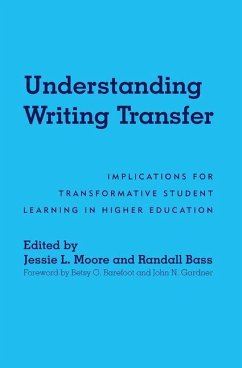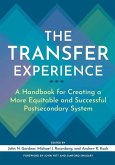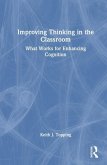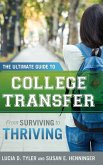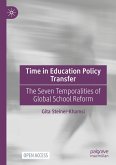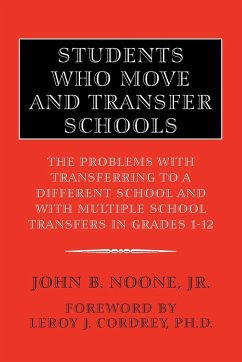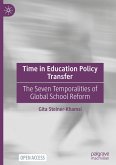Understanding Writing Transfer
Implications for Transformative Student Learning in Higher Education
Herausgeber: Bass, Randall; Moore, Jessie L.
Understanding Writing Transfer
Implications for Transformative Student Learning in Higher Education
Herausgeber: Bass, Randall; Moore, Jessie L.
- Gebundenes Buch
- Merkliste
- Auf die Merkliste
- Bewerten Bewerten
- Teilen
- Produkt teilen
- Produkterinnerung
- Produkterinnerung
Summarises what we know about writing transfer and explores the implications of writing transfer research for universities' institutional decisions about writing across the curriculum requirements, general education programs, online and hybrid learning, outcomes assessment, writing-supported experiential learning, e-portfolios, first-year experiences, and other higher education initiatives.
Andere Kunden interessierten sich auch für
![The Transfer Experience The Transfer Experience]() The Transfer Experience170,99 €
The Transfer Experience170,99 €![Improving Thinking in the Classroom Improving Thinking in the Classroom]() Keith J. ToppingImproving Thinking in the Classroom171,99 €
Keith J. ToppingImproving Thinking in the Classroom171,99 €![Ultimate Guide to College Transfer Ultimate Guide to College Transfer]() Lucia D. TylerUltimate Guide to College Transfer41,99 €
Lucia D. TylerUltimate Guide to College Transfer41,99 €![Time in Education Policy Transfer Time in Education Policy Transfer]() Gita Steiner-KhamsiTime in Education Policy Transfer31,99 €
Gita Steiner-KhamsiTime in Education Policy Transfer31,99 €![Sail Through the Storms with Cash Transfer Sail Through the Storms with Cash Transfer]() Jonatan LassaSail Through the Storms with Cash Transfer27,99 €
Jonatan LassaSail Through the Storms with Cash Transfer27,99 €![Students Who Move and Transfer Schools Students Who Move and Transfer Schools]() John B. Jr. NooneStudents Who Move and Transfer Schools18,99 €
John B. Jr. NooneStudents Who Move and Transfer Schools18,99 €![Time in Education Policy Transfer Time in Education Policy Transfer]() Gita Steiner-KhamsiTime in Education Policy Transfer38,99 €
Gita Steiner-KhamsiTime in Education Policy Transfer38,99 €-
-
-
Summarises what we know about writing transfer and explores the implications of writing transfer research for universities' institutional decisions about writing across the curriculum requirements, general education programs, online and hybrid learning, outcomes assessment, writing-supported experiential learning, e-portfolios, first-year experiences, and other higher education initiatives.
Produktdetails
- Produktdetails
- Verlag: Routledge
- Seitenzahl: 178
- Erscheinungstermin: 9. Februar 2017
- Englisch
- Abmessung: 235mm x 157mm x 14mm
- Gewicht: 417g
- ISBN-13: 9781620365847
- ISBN-10: 1620365847
- Artikelnr.: 45645160
- Herstellerkennzeichnung
- Libri GmbH
- Europaallee 1
- 36244 Bad Hersfeld
- gpsr@libri.de
- Verlag: Routledge
- Seitenzahl: 178
- Erscheinungstermin: 9. Februar 2017
- Englisch
- Abmessung: 235mm x 157mm x 14mm
- Gewicht: 417g
- ISBN-13: 9781620365847
- ISBN-10: 1620365847
- Artikelnr.: 45645160
- Herstellerkennzeichnung
- Libri GmbH
- Europaallee 1
- 36244 Bad Hersfeld
- gpsr@libri.de
Randall Bass is Vice Provost for Education and Professor of English at Georgetown University, where he leads the Designing the Future(s) initiative and the Red House incubator for curricular transformation. For 13 years he was the Founding Executive Director of Georgetown's Center for New Designs in Learning and Scholarship (CNDLS). He has been working at the intersections of new media technologies and the scholarship of teaching and learning for nearly thirty years, including serving as Director and Principal Investigator of the Visible Knowledge Project, a five-year scholarship of teaching and learning project involving 70 faculty on 21 university and college campuses. In January 2009, he published a collection of essays and synthesis of findings from the Visible Knowledge Project under the title, "The Difference that Inquiry Makes," (co-edited with Bret Eynon) in the digital journal Academic Commons (January 2009: http://academiccommons.org). Bass is the author and editor of numerous books, articles, and electronic projects, including recently, "Disrupting Ourselves: the Problem of Learning in Higher Education" (Educause Review, March/April 2012). He is currently a Senior Scholar with the American Association for Colleges and Universities. Jessie L. Moore is Director of the Center for Engaged Learning and Associate Professor of English: Professional Writing & Rhetoric. She leads planning, implementation, and assessment of the Center's research seminars, which support multi-institutional inquiry on high-impact pedagogies and other focused engaged learning topics. Her recent research examines transfer of writing knowledge and practices, multi-institutional research and collaborative inquiry, writing residencies for faculty writers, the writing lives of university students, and high-impact pedagogies. She co-edited Critical Transitions: Writing and the Question of Transfer (2016). She currently serves as the elected Secretary of the Conference on College Composition and Communication. Dr. John N. Gardner is an undergraduate student success thought leader and a social justice advocate. He is Chief Executive Officer and Chair of the non-profit, the John N. Gardner Institute for Excellence in Undergraduate Education, co-founded by him and his wife, Betsy O. Barefoot, in 1999. John is also Distinguished Professor Emeritus and Senior Fellow, University of South Carolina at Columbia. He was also the Founding Executive Director of both the National Resource Center for the First-Year Experience and Students in Transition, and the University 101 Programs. He also served as Vice Chancellor for Academic Affairs for the University's five Regional Campuses. Subscribe to the Office Hours with John Gardner: Innovation in Higher Education podcast. Betsy O. Barefoot is Vice President & Senior Scholar at the Gardner Institute for Excellence in Undergraduate Education.
Foreword-Betsy O. Barefoot and John N. Gardner 1. Five Essential Principles
About Writing Transfer-Jessie L. Moore Part One. Critical Sites of Impact
2. Transfer and Educational Reform in the Twenty-First Century. College and
Career Readiness and the Common Core Standards-Linda Adler-Kassner 3.
Pedagogy and Learning in a Digital Ecosystem-Rebecca Frost Davis 4.
Writing, Transfer, and ePortfolios. A Possible Trifecta in Supporting
Student Learning-Kathleen Blake Yancey 5. Writing High-Impact Practices.
Developing Proactive Knowledge in Complex Contexts-Peter Felten 6.
Diversity, Global Citizenship, and Writing Transfer-Brooke Barnett, Woody
Pelton, Francois Masuka, Kevin Morrison, and Jessie L. Moore 7. Telling
Expectations About Academic Writing. If Not Working, What About
Knotworking?-Carmen M. Werder Part Two. Principles at Work. Implications
for Practice Case Studies 8. Rethinking the Role of Higher Education in
College Preparedness and Success From the Perspective of Writing
Transfer-Alison Farrell, Sandra Kane, Cecilia Dube, and Steve Salchak 9.
Teaching for Transfer-Liane Robertson and Kara Taczak 10. Student Drafting
Behaviors in and Beyond the First-Year Seminar-Diane E. Boyd 11. Cueing and
Adapting First-Year Writing Knowledge. Support for Transfer Into
Disciplinary Writing-Gwen Gorzelsky, Carol Hayes, Ed Jones, and Dana Lynn
Driscoll 12. Promoting Cross-Disciplinary Transfer. A Case Study in Genre
Learning-Mary Goldschmidt 13. "The Hardest Thing With Writing Is Not
Getting Enough Instruction". Helping Educators Guide Students Through
Writing Challenges-Elizabeth Wardle and Nicolette Mercer Clement 14.
Coda-Randall Bass About the Editors and Contributors Index
About Writing Transfer-Jessie L. Moore Part One. Critical Sites of Impact
2. Transfer and Educational Reform in the Twenty-First Century. College and
Career Readiness and the Common Core Standards-Linda Adler-Kassner 3.
Pedagogy and Learning in a Digital Ecosystem-Rebecca Frost Davis 4.
Writing, Transfer, and ePortfolios. A Possible Trifecta in Supporting
Student Learning-Kathleen Blake Yancey 5. Writing High-Impact Practices.
Developing Proactive Knowledge in Complex Contexts-Peter Felten 6.
Diversity, Global Citizenship, and Writing Transfer-Brooke Barnett, Woody
Pelton, Francois Masuka, Kevin Morrison, and Jessie L. Moore 7. Telling
Expectations About Academic Writing. If Not Working, What About
Knotworking?-Carmen M. Werder Part Two. Principles at Work. Implications
for Practice Case Studies 8. Rethinking the Role of Higher Education in
College Preparedness and Success From the Perspective of Writing
Transfer-Alison Farrell, Sandra Kane, Cecilia Dube, and Steve Salchak 9.
Teaching for Transfer-Liane Robertson and Kara Taczak 10. Student Drafting
Behaviors in and Beyond the First-Year Seminar-Diane E. Boyd 11. Cueing and
Adapting First-Year Writing Knowledge. Support for Transfer Into
Disciplinary Writing-Gwen Gorzelsky, Carol Hayes, Ed Jones, and Dana Lynn
Driscoll 12. Promoting Cross-Disciplinary Transfer. A Case Study in Genre
Learning-Mary Goldschmidt 13. "The Hardest Thing With Writing Is Not
Getting Enough Instruction". Helping Educators Guide Students Through
Writing Challenges-Elizabeth Wardle and Nicolette Mercer Clement 14.
Coda-Randall Bass About the Editors and Contributors Index
Foreword-Betsy O. Barefoot and John N. Gardner 1. Five Essential Principles
About Writing Transfer-Jessie L. Moore Part One. Critical Sites of Impact
2. Transfer and Educational Reform in the Twenty-First Century. College and
Career Readiness and the Common Core Standards-Linda Adler-Kassner 3.
Pedagogy and Learning in a Digital Ecosystem-Rebecca Frost Davis 4.
Writing, Transfer, and ePortfolios. A Possible Trifecta in Supporting
Student Learning-Kathleen Blake Yancey 5. Writing High-Impact Practices.
Developing Proactive Knowledge in Complex Contexts-Peter Felten 6.
Diversity, Global Citizenship, and Writing Transfer-Brooke Barnett, Woody
Pelton, Francois Masuka, Kevin Morrison, and Jessie L. Moore 7. Telling
Expectations About Academic Writing. If Not Working, What About
Knotworking?-Carmen M. Werder Part Two. Principles at Work. Implications
for Practice Case Studies 8. Rethinking the Role of Higher Education in
College Preparedness and Success From the Perspective of Writing
Transfer-Alison Farrell, Sandra Kane, Cecilia Dube, and Steve Salchak 9.
Teaching for Transfer-Liane Robertson and Kara Taczak 10. Student Drafting
Behaviors in and Beyond the First-Year Seminar-Diane E. Boyd 11. Cueing and
Adapting First-Year Writing Knowledge. Support for Transfer Into
Disciplinary Writing-Gwen Gorzelsky, Carol Hayes, Ed Jones, and Dana Lynn
Driscoll 12. Promoting Cross-Disciplinary Transfer. A Case Study in Genre
Learning-Mary Goldschmidt 13. "The Hardest Thing With Writing Is Not
Getting Enough Instruction". Helping Educators Guide Students Through
Writing Challenges-Elizabeth Wardle and Nicolette Mercer Clement 14.
Coda-Randall Bass About the Editors and Contributors Index
About Writing Transfer-Jessie L. Moore Part One. Critical Sites of Impact
2. Transfer and Educational Reform in the Twenty-First Century. College and
Career Readiness and the Common Core Standards-Linda Adler-Kassner 3.
Pedagogy and Learning in a Digital Ecosystem-Rebecca Frost Davis 4.
Writing, Transfer, and ePortfolios. A Possible Trifecta in Supporting
Student Learning-Kathleen Blake Yancey 5. Writing High-Impact Practices.
Developing Proactive Knowledge in Complex Contexts-Peter Felten 6.
Diversity, Global Citizenship, and Writing Transfer-Brooke Barnett, Woody
Pelton, Francois Masuka, Kevin Morrison, and Jessie L. Moore 7. Telling
Expectations About Academic Writing. If Not Working, What About
Knotworking?-Carmen M. Werder Part Two. Principles at Work. Implications
for Practice Case Studies 8. Rethinking the Role of Higher Education in
College Preparedness and Success From the Perspective of Writing
Transfer-Alison Farrell, Sandra Kane, Cecilia Dube, and Steve Salchak 9.
Teaching for Transfer-Liane Robertson and Kara Taczak 10. Student Drafting
Behaviors in and Beyond the First-Year Seminar-Diane E. Boyd 11. Cueing and
Adapting First-Year Writing Knowledge. Support for Transfer Into
Disciplinary Writing-Gwen Gorzelsky, Carol Hayes, Ed Jones, and Dana Lynn
Driscoll 12. Promoting Cross-Disciplinary Transfer. A Case Study in Genre
Learning-Mary Goldschmidt 13. "The Hardest Thing With Writing Is Not
Getting Enough Instruction". Helping Educators Guide Students Through
Writing Challenges-Elizabeth Wardle and Nicolette Mercer Clement 14.
Coda-Randall Bass About the Editors and Contributors Index

